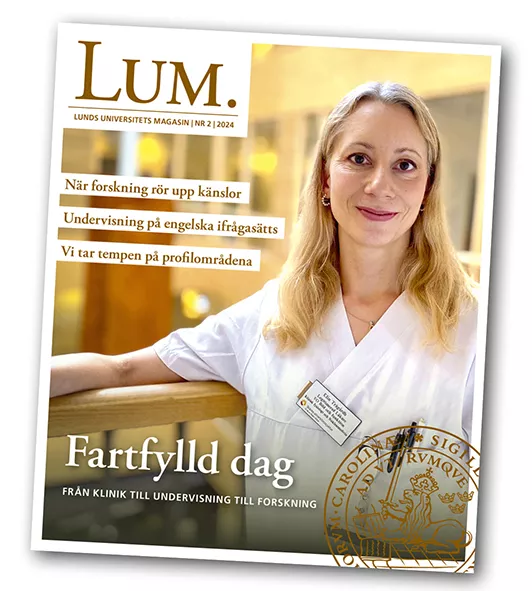The number of flights booked between April and October 2020 fell by 97 percent compared with 2019. Based on average emissions of previous travel, this means a reduction in CO2 of around 3 400 tonnes. This is needed, as LU’s new sustainability plan is more ambitious in terms of environmental targets than the previous environmental management plans.
“However, to achieve the CO2 emissions target we need to maintain a lower level of air travel over the long term and not return to how things were before the pandemic. The entire University will have to take on this challenge”, explains environmental manager Claes Nilén.
More activities need to be established
More activities need to be established to achieve the emissions target; increasing the proportion of digital meetings is one of them. That project has moved slowly for several years but has now made huge strides towards the goal during the pandemic. Another activity is encouraging students and employees to reduce how much CO2 they produce when commuting to and from the University. A first step is analysing travel patterns. The possibility of purchasing renewable aviation fuel for business travel, in addition to the already approved purchase of renewable fuel travel by management, is to be examined and a climate compensation fund established.
However, LU’s new sustainability plan, which applies for the period 2020-2026, has a broad scope and tackles much more than just climate targets. In principle every aspect is included – sustainability in education, research, external engagement, work environment and organisational development.
“I am particularly pleased about the broad scope of the plan. The sustainability plan is a step on the way to more specific initiatives on many levels”, says Nilén.
Firmly established plan
The plan is based on the strategy for sustainable development and has been produced with the help of ten working groups and one round of consultations, so it is firmly established. The University management believes that LU’s greatest contribution to a sustainable world is its research and for all students to have a sustainable perspective baked into their education. However, Lund students do not entirely agree and have so far not been satisfied with LU’s sustainability initiatives in terms of practicing what they preach. One way they are driving this issue is by organising themselves in the Climate Class group.
“The transition is happening faster now thanks to the students”, adds Nilén.
"Mediocre" ranking according to Climate Students
The Klimatstudenterna (Climate Students) group’s ranking of Swedish higher education institutions was also released in September, with LU coming eighth out of sixteen – a ranking that is not good enough, according to the group.
“It is too low for a higher education institution ranked among the best in Sweden. To be mediocre in terms of countering climate change could lead to a loss of legitimacy”, explains Moa Andersson, vice chair of the group.
She adds that values are highly important to the Greta generation; they want to study and work at a University of which they are proud.
LU invests to strengthen sustainability
The University is now making more investments to strengthen the overall sustainability approach. One such effort is to make the Sustainability Forum permanent and expand its resources from SEK 2 to 4 million per year.
“Another new aspect is the strategic management support – we must support heads of department, deans and the University management in their implementation of the sustainability plan”, explains Anna Ekberg, before adding that there are representatives from every faculty on the board of the Sustainability Forum.
The Sustainability Forum is currently working together with the central boards, such as the Education Board, Research Board and Research Programmes Board.
Furthermore, the sustainability plan includes stricter procurement requirements for suppliers of catering, restaurants and cafes on campus – their products are now to be either eco-labelled, fair trade, or MSC-approved.
“Återbrukstorget (the recycling market) can potentially be brought to life in some form and serve as an internal Blocket-style website for Lund University – where people can buy or sell used office chairs, desks and other furniture”, notes Nilén.
“The sustainability plan is to be revised in 2022, at which point the effects of the various initiatives will be described in more detail. This will represent another important step”, he adds. The overall climate footprint of LU will also be measured for the first time – a complicated equation including CO2 emissions for consumption, all purchases and the climate impact of new construction.
“It is the major challenge for us in 2021 – measuring LU’s entire climate footprint. But we think we know how to approach it”, concludes Nilén.



